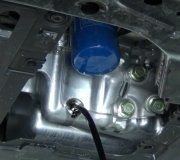This was an experiment on an engine I thought was about to fail, and was done to show my students what some engines are capable of. After five years of this abuse, it became obvious there was no point in changing what was working. I am not suggesting anyone else do this, especially when newer engines wouldn't survive, and I don't do this to any of my other vehicles.
To explain further, I have to add a quart every 1,000 miles, so the engine gets continually replenished with the additives in the oil. There's enough additives in one quart of oil to do what it needs to do, so my engine gets new additives every 1,000 miles. When you go 3,000 miles or more, your additives are depleted. Mine never are. Plus, I use only the cheapest farm and home store oil I can find.
That argument doesn't make up for the sludge and carbon that build up in the oil, but replacing the filter every few years makes me feel less neglectful. The point of this reply is to show that you can have a grossly-neglected engine last for 420,000 miles, and you can have a carefully-maintained engine fail in well under 50,000 miles.
My former student who works at a Ford dealership as an alignment and engine specialist tells me the horror stories when he calls me every few days. To listen to him, you better stick with the highest quality oil you can find.
Sunday, November 22nd, 2015 AT 12:28 AM




